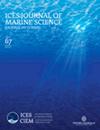Patterns of declining zooplankton energy in the northeast Atlantic as an indicator for marine survival of Atlantic salmon
IF 3.4
2区 农林科学
Q1 FISHERIES
引用次数: 0
Abstract
Return rates of Atlantic salmon (Salmo salar) from the sea to European rivers have declined in recent decades. The first months at sea are critical for growth and survival; recent evidence suggests that reduced food availability may be a contributory factor to the observed declines. Here, zooplankton abundance data are used to derive a measure of prey energy available to forage fish prey of salmon during early marine migration. This zooplankton prey energy has significantly and dramatically declined over much of the northeast Atlantic, and specifically within key salmon migration domains, over the past 60 years. Marine return rates from a set of southern European populations are found to exhibit clustering not entirely predictable from geographical proximity. Variability in grouped return rates from these populations is correlated with zooplankton energy on a range of scales, demonstrating the potential use of zooplankton energy as an indicator of salmon marine survival. Comparison with environmental variables derived from ocean model reanalysis data suggests zooplankton energy is regulated by a combination of climate change impacts on ecosystem productivity and multi-decadal variability in water mass influence along the migration routes.作为大西洋鲑鱼海洋生存指标的东北大西洋浮游动物能量下降模式
近几十年来,大西洋鲑鱼(Salmo salar)从海洋返回欧洲河流的比率有所下降。在海上的头几个月对生长和存活至关重要;最近的证据表明,食物供应的减少可能是导致观察到的下降的一个因素。在这里,浮游动物丰度数据被用来衡量鲑鱼在早期海洋洄游过程中觅食鱼类可获得的猎物能量。在过去 60 年中,浮游动物的猎物能量在大西洋东北部大部分地区,特别是在鲑鱼洄游的关键区域,出现了显著和急剧下降。研究发现,一组南欧种群的海洋回归率呈现出集群现象,而这种集群现象并不能完全从地理上的接近性预测出来。这些种群的分组回归率的变化与浮游动物能量在一定范围内存在相关性,这表明浮游动物能量有可能被用作鲑鱼海洋生存的指标。与海洋模型再分析数据得出的环境变量进行比较后发现,浮游动物的能量受气候变化对生态系统生产力的影响和迁徙路线沿线水团影响的十年变化的综合影响。
本文章由计算机程序翻译,如有差异,请以英文原文为准。
求助全文
约1分钟内获得全文
求助全文
来源期刊

ICES Journal of Marine Science
农林科学-海洋学
CiteScore
6.60
自引率
12.10%
发文量
207
审稿时长
6-16 weeks
期刊介绍:
The ICES Journal of Marine Science publishes original articles, opinion essays (“Food for Thought”), visions for the future (“Quo Vadimus”), and critical reviews that contribute to our scientific understanding of marine systems and the impact of human activities on them. The Journal also serves as a foundation for scientific advice across the broad spectrum of management and conservation issues related to the marine environment. Oceanography (e.g. productivity-determining processes), marine habitats, living resources, and related topics constitute the key elements of papers considered for publication. This includes economic, social, and public administration studies to the extent that they are directly related to management of the seas and are of general interest to marine scientists. Integrated studies that bridge gaps between traditional disciplines are particularly welcome.
 求助内容:
求助内容: 应助结果提醒方式:
应助结果提醒方式:


